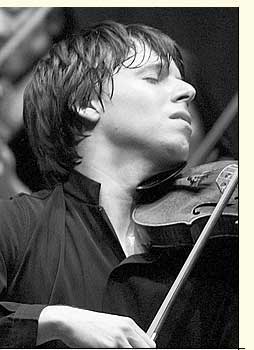Joshua Bell @ Kennedy Center
 Washington Performing Arts Society knows a reliable hit when it sees one, and it has been banking on Joshua Bell for fourteen years. For his latest WPAS recital, on Monday night, Bell and pianist Jeremy Denk came through again, selling out the Kennedy Center Concert Hall. Bell's superstar career is due at least partially to his technical assurance, but most serious listeners will concede that another part of his success has to do with his charming persona. His breezy Midwestern appeal, smart but cheerfully pleasant, comes across in the interview he gave recently to Deb Lamberton (MP3: Classical Conversation with Joshua Bell) for WETA-FM.
Washington Performing Arts Society knows a reliable hit when it sees one, and it has been banking on Joshua Bell for fourteen years. For his latest WPAS recital, on Monday night, Bell and pianist Jeremy Denk came through again, selling out the Kennedy Center Concert Hall. Bell's superstar career is due at least partially to his technical assurance, but most serious listeners will concede that another part of his success has to do with his charming persona. His breezy Midwestern appeal, smart but cheerfully pleasant, comes across in the interview he gave recently to Deb Lamberton (MP3: Classical Conversation with Joshua Bell) for WETA-FM.
A similar retiring, sweet-faced quality comes across in the tone that Bell draws from the Gibson ex-Huberman, a 1713 Stradivarius that the Indiana-born violinist rescued from a regrettable fate, mute internment in an instrument collection, a few years ago. Ionarts had to miss Bell's last appearance in Washington, an all-Schumann concert at the Library of Congress in December 2006, although Jens did review his last appearance with the Baltimore Symphony, playing the Corigliano Red Violin Concerto. Jens also recently reviewed Bell's Red Violin Concerto CD, and all of Washington certainly remembers the Post's Metro experiment in which Bell took part last year.
The most important work on the program was Prokofiev's first violin sonata, op. 80. A favorite work, it has been welcome to my ears in performances by Leila Josefowicz and Midori. Bell's rendition of the striking melismas that form the second theme of the first movement, described by the composer as "the wind in the graveyard," came off as a little too notey. The mood implied by Prokofiev's marking (freddo, or cold) did not come through, as Bell did not deaden the edge of his warm tone quite enough. Bell may not get all of the notes in fast passages, but his tone has a burr at its edge that gains traction in one's ear.
Pianist Jeremy Denk is an able partner for Bell, willing to follow him off the edge of a cliff, relishing the motoric hammered notes in the second movement (marcatissimo e pesante!) and the spiteful rhythmic displacements. Where the duo's strengths matched best with the sonata was in the third movement, creating a lovely image from the piano's murmuring sextuplets and the mushy G string melody. It was a Debussyesque sound world in which one could easily lose oneself, wandering like Mélisande. The fourth movement's shifting meters gave the impression more of someone trapped in quicksand than engaged in a wrong-footed dance. Without the emotional impact of the graveyard wind, the return of that music at the sonata's end lost most of its punch.
Robert Battey, Joshua Bell: The Fast and the Furious (Washington Post, March 5)
Chris Shull, Joshua Bell's star shines bright (Fort Worth Star-Telegram, March 5)
Tom Murray, Bell gives audience top value for top ticket (Edmonton Journal, February 22)
Bryant Manning, Denk holds his own with more highly touted Bell (Chicago Sun-Times, February 19)
Bernard Holland, Headlong Rush for All Occasions (New York Times, February 16)
Larry Fuchsberg, Violinist Joshua Bell has grown thoughtful yet kept his daring (Minneapolis Star Tribune, February 11)
The rest of the program was on the saccharine side. Tartini's "Devil's Trill" sonata is a dramatic vehicle for Bell, a fantasia of technical demands to play with one's eyes closed (see photo). Too bad that it sounded more like Paganini in style. Dvořák's Four Romantic Pieces, op. 75, will make nice encores for Bell, with plenty of gypsy bravura in no. 2 and a sobbing melody of Romantic anguish in no. 4. The long first movement of the final selection, Saint-Saëns' first violin sonata (D minor, op. 75), was more of a workout for Denk than Bell, who has mostly to soar above the fray with Gallic charm. (One of Denk's recent blog entries is about how he stays sane on tour.)
The best movement of this not-terrible sonata was the third-movement scherzo, while the fourth movement was an impressive blur of running notes, during which Bell paid back Denk for the first movement. The encores continued the tone of sweet diversion and irony, with Bell's arrangement of Fauré's song Après un rêve and Heifetz's arrangement of Prokofiev's March from Love of Three Oranges.
The next three recitals sponsored by WPAS feature pianists Lang Lang (March 11, Kennedy Center), Yundi Li (March 12, Strathmore), and Alfred Brendel (March 17, Strathmore). All concerts begin at 8 pm.





















































No comments:
Post a Comment